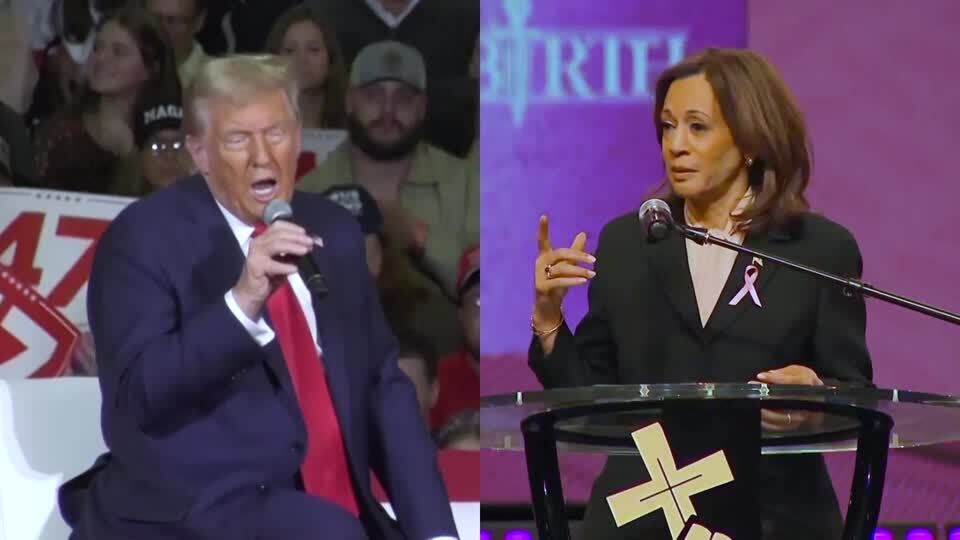
A Reuters/Ipsos survey indicates that despite voter despair, Harris leads Trump by 46%–43%
According to a recent Reuters/Ipsos survey, Democratic U.S. Vice President Kamala Harris led Republican former President Donald Trump by a slim margin of 46% to 43%. The voter is pessimistic, believing the nation is headed in the wrong direction.
With only two weeks remaining until the Nov. 5 election, Harris’ edge in the six-day poll, which ended on Monday, was not much different from her 45% to 42% lead over Trump in a Reuters/Ipsos poll taken a week earlier as evidence that the race is extremely close.
Harris was up by just 2 percentage points when considering unrounded data in the most recent survey, but both polls showed her with a lead inside the margin of error.
According to the latest survey, respondents generally support Trump’s stance on immigration and the economy, and they have a negative opinion of both.
About 70% of the poll’s registered voters said that their cost of living was out of line, 60% believed that the economy was in the wrong way, and 65% believed that immigration policy was also in the wrong direction.
Additionally, voters cited challenges to democracy, immigration, and the economy as the nation’s top issues. When asked which candidate had a better approach to the issues, Trump won 46% of the vote on the economy and 38% of the vote on immigration.
When asked what the next president should prioritize during their first 100 days in office, immigration was the most popular response. 35% of respondents chose immigration, 11% cited income disparity, and 10% cited taxes and healthcare.
On the subject of who was more suited to deal with political extremism and challenges to democracy, however, Trump did not perform well, with Harris leading 42% to 35%. She was also in charge of healthcare and abortion policy.
SUPERIORLY NEAR RACE
Even if Harris’ lead over Trump lasts until November 5, it could not be sufficient to win the election.
The victor is decided by the state-by-state results of the Electoral College, with seven battleground states expected to be crucial. National surveys, such as Reuters/Ipsos polls, provide significant indications of the electorate’s opinions. In the 2016 election, Trump won the Electoral College despite Hillary Clinton’s two-point victory in the national popular vote.
Trump and Harris are tied in key crucial states, according to polls.
Voters, especially Democrats, may be more excited about this year’s election than they were when Democrat Joe Biden upset Trump in the November 2020 presidential election, according to the survey.
According to the study, 79% of registered voters claimed to be “completely certain” that they will vote in the presidential election, including 87% of Democrats and 84% of Republicans. The percentage of respondents who indicated they were certain to vote increased from 74% in a Reuters/Ipsos survey that was conducted from October 23–27, 2020, in which 79% of Republicans and 74% of Democrats said they were certain to vote.
The margin of error for the new survey was two percentage points.
After Biden dropped out of the reelection run after a dismal debate performance against Trump in June, Harris entered the race in July. Due in part to his projected economic strength following years of high inflation under the Biden administration, which has since decreased, Trump was largely seen as the front-runner at the time.
The candidates’ attempts to get their supporters to actually cast ballots will probably be crucial in deciding the winner because of the close contest. According to estimates from the Pew Research Center and the U.S. Census Bureau, just two-thirds of American adults cast ballots in the November 2020 election, the greatest turnout in more than a century.
According to a Pew Research estimate, around one-third of registered voters are Democrats and one-third are Republicans, with the remaining percentage being independents or third-party supporters.
4,129 American people countrywide, including 3,481 registered voters, were polled online in the most recent Reuters/Ipsos survey. On election day, 3,307 of the respondents were thought to be the most likely to vote. Harris led Trump by three percentage points, 48% to 45%, among these potential voters.
All Categories
Recent Posts
Tags
+13162306000
zoneyetu@yahoo.com


